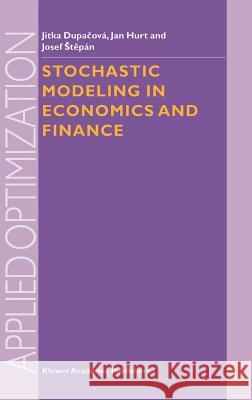Stochastic Modeling in Economics and Finance » książka
Stochastic Modeling in Economics and Finance
ISBN-13: 9781402008405 / Angielski / Twarda / 2002 / 386 str.
Unlike other books that focus only on selected specific subjects this book provides both a broad and rich cross-section of contemporary approaches to stochastic modeling in finance and economics; it is decision making oriented. The material ranges from common tools to solutions of sophisticated system problems and applications.
In Part I, the fundamentals of financial thinking and elementary mathematical methods of finance are presented. The method of presentation is simple enough to bridge the elements of financial arithmetic and complex models of financial math developed in the later parts. It covers characteristics of cash flows, yield curves, and valuation of securities.
Part II is devoted to the allocation of funds and risk management: classics (Markowitz theory of portfolio), capital asset pricing model, arbitrage pricing theory, asset & liability management, value at risk. The method explanation takes into account the computational aspects.
Part III explains modeling aspects of multistage stochastic programming on a relatively accessible level. It includes a survey of existing software, links to parametric, multiobjective and dynamic programming, and to probability and statistics. It focuses on scenario-based problems with the problems of scenario generation and output analysis discussed in detail and illustrated within a case study. Selected examples of successful applications in finance, production planning and management of technological processes and electricity generation are presented. Throughout, the emphasis is on the appropriate use of the techniques, rather than on the underlying mathematical proofs and theories.
In Part IV, the sections devoted to stochastic calculus cover also more advanced topics such as DDS Theorem or extremal martingale measures, which make it possible to treat more delicate models in Mathematical Finance (complete markets, optimal control, etc.)
Audience: Students and researchers in probability and statistics, econometrics, operations research and various fields of finance, economics, engineering, and insurance.











